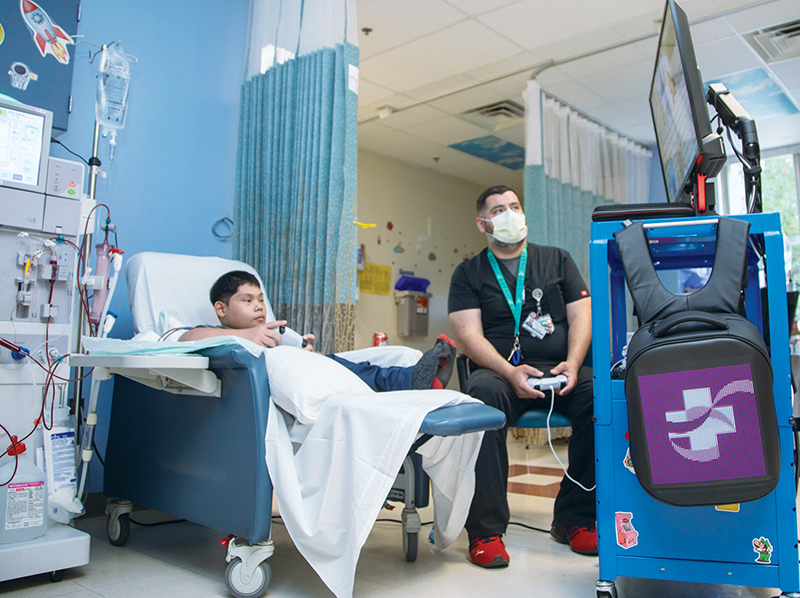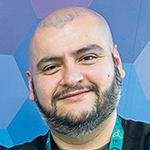 Jacob Solis plays video games with a patient at CHRISTUS Children's in San Antonio, where Solis is the hospital's first gaming and technology specialist.
Jacob Solis plays video games with a patient at CHRISTUS Children's in San Antonio, where Solis is the hospital's first gaming and technology specialist.When Jacob Solis comes into a patient's room at CHRISTUS Children's in San Antonio with his cart of video games, their eyes brighten.
They know he's there to distract them, challenge them, relax them or get them moving. Solis is the hospital's first and only gaming and technology specialist, a role he has had since February.
"Just seeing how they light up once I finish the gaming session, or even when I walk into the room, they just get all excited," he says. "It really helps to turn how they're feeling around."
Is he the most popular guy in the hospital?
"They call me The Gaming Guy," Solis responds. And he says they ask other hospital staffers: "When can I see The Gaming Guy?"
Solis' position is sponsored by Child's Play Charity, a nonprofit based in Seattle that seeks to improve the lives of children and teens in hospitals through gaming.
The organization funded the first pediatric gaming and technology specialists in children's hospitals in 2017 and now supports 49 gaming technology specialist positions. It has almost 200 hospital partners worldwide. It funds the specialists for two
years with the expectation that the hospital will take over after that. Other Catholic hospitals that have a gaming technologist include Elizabeth Seton Children's Center in Yonkers, New York, and Dell Children's Medical Center, an Ascension hospital
in Austin, Texas.
Child's Play also offers an online therapeutic video game guide focused on how to be more intentional with choosing specific games for a child.
Solis makes use of games known to help with anxiety or quell boredom and others that can distract from pain. Some patients might need to sit still for an hour while undergoing treatment, so nurses will ask him to play games while the patient sits in a
chair. Other patients might need to move, so Solis might get them to walk to the teen lounge, where gaming systems are set up, or play an interactive dancing or virtual reality game.

Kirsten Carlile, the senior director of philanthropy and partner experience for Child's Play, says the use of gaming technology caught on at children's hospitals during the COVID-19 pandemic, and hospitals have figured out how to deal with firewall and
privacy issues. Now, Child's Play has a waiting list of funding requests for gaming technology specialists.
"So we have to go and actually work with the hospital to say, 'Are you ready? What do you have for gaming and tech? What are you using?'" Carlile says.
She points out hospitals can use gaming and technology like MRI goggles to distract and keep patients still so they need less sedation, or physical therapists can get kids moving while playing a Wii game. "We're using (gaming) in ways that are taking
the pharmacological interventions away for pediatric, which is huge," Carlile says. "It's changing the patient experience, but it's changing the hospital throughput as well."
 Solis
SolisA day's work
Solis, 38, graduated college with a degree in business administration and a certification in cybersecurity. He has worked as an emergency medical technician and as a program leader for the Boy Scouts of America. He's
loved video gaming since he was 4 and had dreamt of playing or making video games for a living.
"I love working with children, and this was like coming back to work with children again," he says. "The job sounded great, but it's also a blessing to help children who are in need during their difficult times here at the hospital, to help them with
their stay and to give support to the medical staff."
A typical day starts with checking the referrals from the team of about 10 child life specialists at the hospital. They will talk to patients and their families to see if they might benefit from a gaming session with Solis.
Solis sees about four or five patients a day for gaming sessions that last 30 to 90 minutes. He helps with other projects, such as fixing a gaming console or making use of a 3D printer. He's in high demand, so he tries to set up sessions with patients
twice a week. If he's not available, and in the evening and on weekends, patients can use a gaming cart, visit a teen gaming room or play in a kids' zone.
"I have seen some patients who are the same age and encourage them, like, 'Hey, let's go downstairs and let's play together. Let's get a group game going, like Mario Kart or Minecraft or Fortnite,'" he says. The activity cheers patients up, helps form
friendships and builds morale.
The hospital has gaming systems that the patients can keep in their rooms, and Solis has a gaming cart with Nintendo Switch, Xbox, PlayStation, and a VR Oculus for older children and teens. Patients are provided with a secure user account.
Solis communicates with other hospital gaming specialists through a Child's Play account on the messaging platform Slack, where they bounce around ideas and suggestions. He asked for other specialists' advice on a weekly video gaming show he started in
June, called Game Time with Jacob, that plays on the hospital's closed circuit television network. During the program, Solis gives
viewers tips and tricks on the games available at the hospital and talks to them about games as he plays.
"I try to make it entertaining," he says. "Sometimes, I host with patients, too. One patient wasn't able to leave the room, so I set up the gaming show in his room, and we played Minecraft together and we made a show. It's a great experience for patients
who would like to do something new: host a game show and play video games for everyone to watch."
What sets him apart
Some patients play with their parents and Solis gives them tips, too. He prides himself on being an expert.
"When they play with me, I make it interesting. I know the game," he says. "I talk to them about video games, and sometimes I make it challenging for them, so they want to play more to maybe beat me, or we team up on a hard video game."
And, yes, if he thinks the patient would gain confidence or benefit from the encouragement of winning, he lets them. But that's tough sometimes, he jokes.
Solis says doctors and other caregivers are "thrilled" and also "just shocked" to have him on staff. "A lot of doctors and nurses don't know how to play, and the patients will ask them questions, and they say, 'I don't know,'" he says. "They love that
I come and help them or show a few things."
Caregivers also are grateful that Solis can help distract and support patients if they need to get a shot or have an IV placed.
He encourages other hospitals that don't employ gaming technology specialists to investigate the benefits.
"Some patients are just not feeling so well, and they're not in the mood to play," Solis says. "But to get them to cross that line and to play – it's challenging, and it's very rewarding for them and me. It's a great blessing."